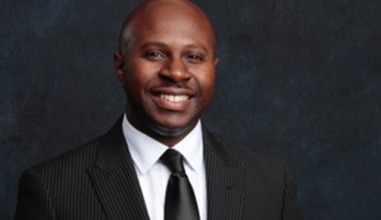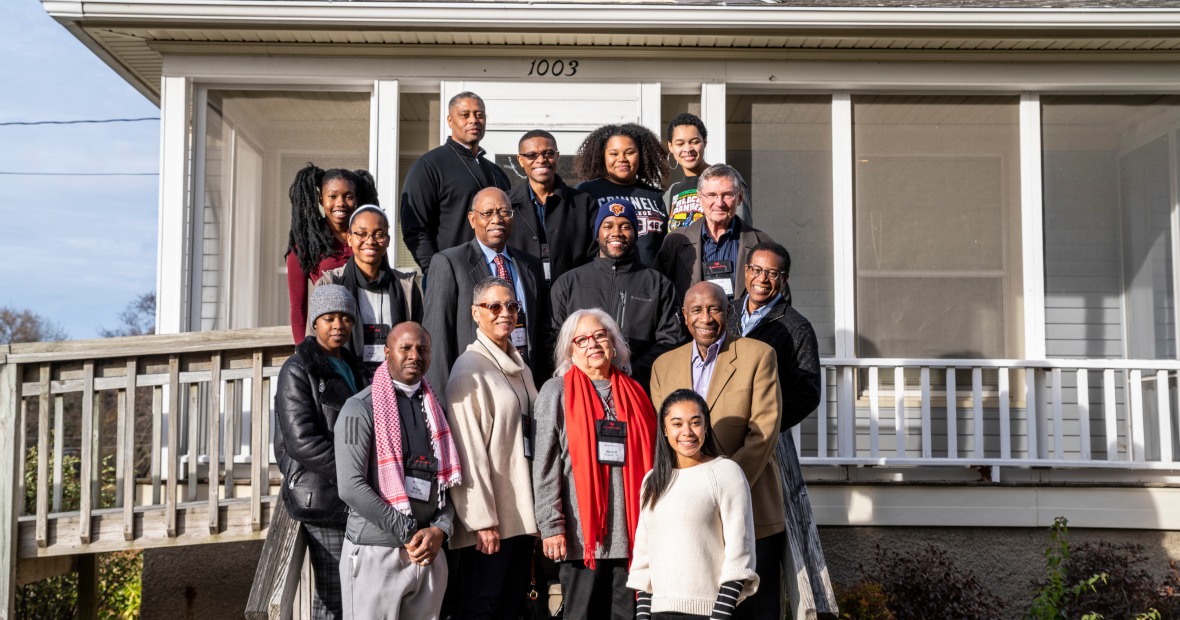Lifting Up a Legacy
Brian Smith feels a duty of care for his fellow clergy

In 2020, as Covid forced people around the world to isolate, faith leaders were struggling to find ways to stay connected with their congregations.
For Pastor Brian Smith ’94, it meant spending hours and hours on the phone each week, calling each member of his small congregation at the Northshore Faith Community Church in Lake Bluff, Ill., on the north shore of Chicago. He kept up this practice for almost two years.
Imagine, he adds, how that would multiply for pastors with larger congregations. Faith leaders took on heavy burdens of worry, concern, and frustration, even putting their own health at risk.
Then George Floyd was murdered by police officers in Minneapolis, and things got worse.
A Duty of Care
“The South Side was devastated,” Smith says. “I don’t think a single commercial entity was untouched. All of the stores, all of the commercial buildings, had been ransacked, and faith leaders were called upon to try to deal with this, in light of Covid.
“Clergy suffered immensely,” he says. “They’re still suffering tremendous health challenges because of the worry and not being connected with the folks they’ve served for so many years.”
Smith made supporting clergy his mission. He is part of an initiative through the Lilly Foundation designed to provide wellness and recovery support for faith leaders. “I’m deeply passionate about being a presence for them and helping them to heal and helping them to live a full and fruitful life,” he says.
Smith met with clergy regularly through 2020 and helped develop counseling and support services. He conducted listening sessions to understand the needs. His efforts led to technology assistance grants to 30 congregations to help them deal with the new reality in which they could not physically be with their congregants.
“It really inspired me to do more,” Smith says. “I think that’s probably going to be the niche of my career. When it’s all said and done, people will talk about how I worked above and beyond to make sure that clergy are well.”
Smith’s outreach extended across all faiths and denominations. He helped develop a group called the Black Faith Leader Collective, including Black Jews, Muslims, and Christians on the south and west sides of Chicago.
“We’ve continued working with them to this day,” Smith says. “As the pandemic evolved, so did the opportunities for funding and partnerships.”
Learning to Think
Smith grew up in Englewood, a community area located on the south side of Chicago. He first became aware of Grinnell through a program designed to help students connect with colleges. He visited Grinnell, was accepted, and received a financial aid package that helped him make his decision.
Moving from Chicago to small-town Iowa wasn’t easy. “There were some significant adjustments I had to make,” he says. “It was a bit easier because of my classmates, but looking back, it was a challenge.”
Smith graduated in 1994 with a degree in political science. After earning a master’s degree in human services administration with a focus on affordable housing, he spent 18 years working on housing issues in communities of need in the Chicago area.It was during this time that Smith accepted the call to ministry. “I had always served in the church and I had never stopped being involved, but I didn’t have a formal title,” he says. He began his studies at the Garrett-Evangelical Theological Seminary in Evanston, Illinois, in 2010. He graduated Theta Alpha Kappa in 2015.
Smith accepted a position with the seminary and became the first African American to work full time in advancement in a leadership capacity at Garrett-Evangelical Theological Seminary. Smith was also serving a congregation while working at the seminary.
When an opportunity presented itself at the Chicago Theological Seminary, Smith accepted. He now serves as director of strategic partnerships at CTS. “I have a lot of latitude to work on various projects that connect with the community,” Smith says.
In 2024, Smith earned a Doctor of Ministry degree in Black Congregational Leadership from Garrett-Evangelical Theological Seminary.
Lifting Up a Legacy
One of his favorite projects has been the Jesse Jackson Oral History Archive Project. Reverend Jackson is an alumnus of CTS, and Smith was charged with developing programming to lift up his legacy.
With a grant from the Dolly Foundation, Smith set out to create an oral history project based on Jackson’s early career, including his leadership of the Reverend Martin Luther King Jr.’s Breadbasket movement in Chicago.
Initiated by the through the Southern Christian Leadership Conference, the movement encouraged members of the Black community to spend money at businesses that invested in their communities. “Dr. King saw this model, adopted it in the South, and then wanted to expand it,” Smith says. “He selected Chicago because he thought it would be a great launching point for the Breadbasket Movement for a national program.”
King chose three seminary students to lead the program in Chicago, one of whom was Jackson. All three were seminary students at CTS, which, like Grinnell College, has roots in Congregationalism and the United Church of Christ.
Stepping Up in a Crisis
Smith’s calling has led him to many projects and places, serving his church and its congregation, the seminary, and his fellow clergy. Through it all, his Grinnell education has served him well.
“I think just having a strong liberal arts education with interdisciplinary studies gives you the ability to look critically at anything,” he says. “You learn how to think, so that when you have a crisis like Covid that nobody was really prepared for, you have the ability to combine ways of thinking.”
He adds, “The ability to think deeply and broadly and critically gives you to be able to assess and respond to situations that most people would be confused by. And I think we were all confused. I think, still, we’re trying to ascertain the impact of the Covid crisis.”

